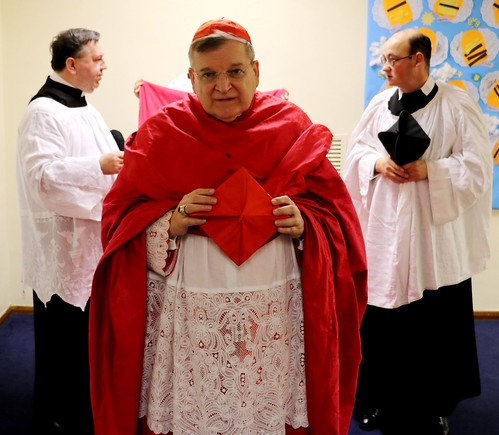 |
| Cardinal Burke with the LMS last year. Photos: Daniel Blackman |
It is being promoted by the people who did the 'filial appeal' before the last Synod on the Family.
It is a magnificent piece of work. Each of 27 paragraphs about a particular issue is supported by several quotations from magisterial documents: Pope St John Paul II, Pius XI and XII, instructions from the Congregation for the Doctrine of the Faith, and so on. They provide irrefutable proof of the solidity of the traditional understanding of the teaching and practice of the Church, and the necessity of the practice in light of the teaching, with crystal clear condemnations of many of the proposals floating about today. It thus makes for a very informative teaching document in itself.
Not being a specialist in this material I didn't know all of these documents before now. Particularly interesting to me were the quotations not only from Pope St John Paul II's Veritatis splendor, but his 1984 Reconciliatio et paenitentia, and the extremely helpful Declaration from the Pontifical Council for Legislative Texts, Communion of faithful who are divorced and remarried. This last is not exactly ancient history: it dates from the year 2000! You'll find it on the Vatican website here.
See what that one says about Catholics whose lives give public scandal even after they have repented and had sacramental absolution: couples in illicit unions who have undertaken to live as 'brother and sister', since they cannot separate:
Those faithful who are divorced and remarried would not be considered to be within the situation of serious habitual sin who would not be able, for serious motives—such as, for example, the upbringing of the children—‘to satisfy the obligation of separation, assuming the task of living in full continence, that is, abstaining from the acts proper to spouses’ (Familiaris consortio, n. 84), and who on the basis of that intention have received the sacrament of Penance. Given that the fact that these faithful are not living more uxorio [as man and wife] is per se occult [i.e., since they are sharing a house so people will assume they are still living as man and wife], while their condition as persons who are divorced and remarried is per se manifest [i.e. it is a public fact that they are not married to each other], they will be able to receive Eucharistic Communion only remoto scandalo [in such a way as won't cause scandal, e.g. privately]…. In those situations, however, in which these precautionary measures have not had their effect or in which they were not possible, the minister of Communion must refuse to distribute it to those who are publicly unworthy. They are to do this with extreme charity, and are to look for the opportune moment to explain the reasons that required the refusal. They must, however, do this with firmness, conscious of the value that such signs of strength have for the good of the Church and of souls…. Bearing in mind the nature of the above-cited norm (cfr. n. 1), no ecclesiastical authority may dispense the minister of Holy Communion from this obligation in any case, nor may he emanate directives that contradict it.
Pontifical Council for Legislative Texts (2000): Communion of faithful who are divorced and remarried, nn. 1-4.
I know from my work on the Position Papers that the doctrinal and policy confusion on the liturgy since the Council has led to official documents in tension with each other and with what actually happens on the ground. What is being proposed as a 'pastoral solution' to the problem of the divorced and remarried would, if officially endorsed, take us into new territory of self-contradiction and incoherence. If the hierarchy can perform a reverse ferret on this topic, no one is going to have any reason to believe them ever again about anything.
Some, of course, would see that as an advantage. Other people would see it as impossible. But it is not impossible: the hierarchy, even the Holy Father, are not miraculously prevented from putting their names to misleading, imprudent, or indeed erroneous documents. What is impossible is that error should be required of Catholics as a matter of belief: or rather, while it is perfectly possible that religious superiors should demand assent to error, and this has happened many, many times in the history of the Church, it is impossible that such assent be a genuine moral obligation.
Among other forms of preparation we need to undertake for the next stages of the current crisis, we all need to bone up, in accordance with our abilities, on what the constant teaching of the Church is. This document will help us do that.
Support the work of the LMS by becoming an 'Anniversary Supporter'.
I cannot sign it. There is some problem with a "bad captcha"?!
ReplyDeleteAlso unable to sign because of "bad captcha"?
Delete"the hierarchy, even the Holy Father, are not miraculously prevented from putting their names to misleading, imprudent, or indeed erroneous documents."
ReplyDeleteIt would be helpful if some examples of this could be enumerated. Thank you!
The Council of Pistoia would be a modern example. Google it.
DeleteBrought to you by the people behind the 'filial appeal'. Remind us how that worked out? How many times does Francis have to demonstrate that he's not a Catholic (and therefore not Pope) before you will acknowledge the fact? Francis has not just 'put his name' to AL, he has written that the only possible interpretation is the heretical interpretation on communion for adulterers. A true Pope is 'the living rule which the Church must follow in belief and always follows in fact' (Card Billot). A true pope does not need to be corrected by academics, demoted Cardinals, retired Cardinals, auxiliary bishops and internet bloggers.
ReplyDelete